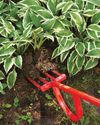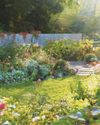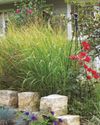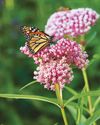
AMEND OR NOT?
While you can improve clay soil by amending with organic matter, such as compost, it's not usually a practical solution for a large area. But it might help in a smaller spot, such as around your home's foundation, where clay has sometimes been brought to the surface and compacted during construction. The old recommendation of tilling in sand will often result in an even harder, denser mess unless you get the proportions just right. Further, simply filling a planting hole with compost creates a small oasis for the roots so they may not venture outside of the hole.
The most successful solution when you want beautiful borders but have a yard full of clay soil is to choose plants that can grow in this sticky situation. Let me introduce you to some clay-tolerant beauties that are up to the challenge.
Rough goldenrod
Solidago rugoso
End your garden season on a high note with the bright yellow blooms of rough goldenrod. Flowers start in late summer, last until frost and are a hub of pollinator activity. The species has arching yellow blooms, but one of its hybrids, *Fireworks, at right, is an easy variety to lind and has larger 18-inch-long sprays. While some species of goldenrod are aggressive, rough goldenrod spreads slowly by rhizomes. Clay soil can help keep it in check. Goldenrod is a versatile plant that isn,t bothered by much-even deer leave it alone. And there's no need to fertilize: Plants grow best in lean soil.
Perennial Blooms: Upright to arching plumes packed with tiny yellow individual blooms in late summer to fall Light: Full sun to part shade Size: 18 to 36 in. tall and wide Cold hardyz USDA zones 4 to 9 Source: High Country Gardens, highcountrygardens.com, 801-769-0300
Russian sage
Perovskia atriplicifolia
Denne historien er fra Issue 179 - October 2024-utgaven av Garden Gate.
Start din 7-dagers gratis prøveperiode på Magzter GOLD for å få tilgang til tusenvis av utvalgte premiumhistorier og 9000+ magasiner og aviser.
Allerede abonnent ? Logg på
Denne historien er fra Issue 179 - October 2024-utgaven av Garden Gate.
Start din 7-dagers gratis prøveperiode på Magzter GOLD for å få tilgang til tusenvis av utvalgte premiumhistorier og 9000+ magasiner og aviser.
Allerede abonnent? Logg på

Spinach - Learn the secrets to growing this tasty green in spring and fall.
If you're one of those gardeners who can't wait to get started in spring and hates to throw in the trowel in fall, spinach is the perfect shoulder season crop. This mild, earthy-flavored green comes in many varieties, ranging from crinkly-leafed savoys to slightly textured semi-savoys and the flat, smooth-leafed types. Colors can be dark green, light green and even red-veined. Here's how to get the most of it every year.

Why Bulb Depth Matters - Dig deep enough to ensure your plants stand tall and live the longest
When you're planting bulbs, it's tempting to just dig a hole as deep as your trowel will reach easily, nestle the bulb in, cover it up and move on. But the fact is, each type of bulb will flower best and thrive at a different depth.A good rule of thumb is to plant a bulb two to three times its height. One reason planting depth is important is because it helps to keep the bulbs protected from fluctuations in temperature that happen closer to the surface.

GARDEN ESSENTIALS
FALL GARDEN CLEANUP TOOLS

Saving Seeds
Saving flower seeds is a great way to get more plants with almost no investment. It's easy to do. Here's how to save seeds from some of your favorite annuals as the growing season winds down.

Cucumber Trellis Flop
I watched cucumber trellis growers online for several seasons with envy. What a brilliant way to save space in raised garden beds and make it look fancy! Finally, I was sold and decided to try it in my garden.

9 Tough Perennials for Clay Soil
Whether you garden in the nutrient-poor red clay of the Southeast, the calcium combined-with-clay caliche of the West or something in between, the common denominator is that clay soil is difficult to grow in. Why? Tiny particles of clay hold tightly together, slowing drainage and limiting the amount of oxygen that can reach plant roots. You've seen the resultsanemic-looking or rotting plants.

Garden Fences
Discover the perfect blend of functionality, style, and materials for your ideal fence.

A GARDEN OF STORIES
Learn plant and project tips from a couple who's been gardening here for nearly 50 years.

Switchgrass
Adaptable switchgrass goes with the flow.

Establish a Monarch Waystation
Did you know that a single monarch butterfly can migrate up to 3,000 miles? That's a lot of ground to cover! This amazing insect makes a fascinating journey, unlike any other butterfly.